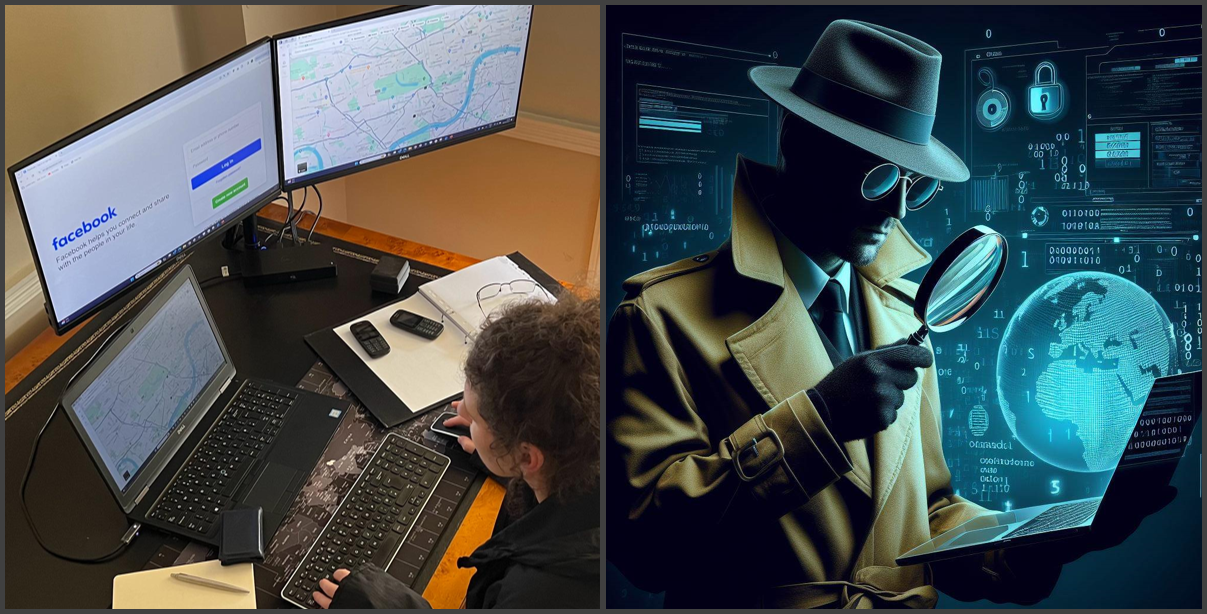A 2022 YouGov poll revealed that half of Americans regularly consumed true crime content, whether through podcasts, television, or streaming services. This trend is not confined to America alone; global audiences also show a keen interest, as true crime consistently ranks as the most common topic among top-ranked podcasts. This widespread fascination has birthed a burgeoning community of modern-day sleuths—individuals leveraging online platforms to crack cases, uncover mysteries, and shed light on unresolved matters. With nothing more than a keyboard and an unyielding quest for answers, these internet sleuths have garnered both admiration and concern. Valkyrie, in our role as experienced investigators used to navigating the complexities of client investigation, often within a legal framework requiring the highest ethical standards; considers the multifaceted nature of this phenomenon, whether there is a place for it and how, if at all it can be harnessed for good.
The rise of the amateur online detective is facilitated by an unprecedented level of digital connectivity, allowing greater access to sources of information and groups who can share ideas and theories. Approximately 69% of the world’s populace now relies on mobile devices, witnessing a significant surge of 138 million users, or 2.5%, since early 2023. Moreover, internet penetration has soared, encompassing over 66% of the global population, totalling 5.35 billion users worldwide—a growth of 1.8% in the past year, equivalent to ninety-seven million new users since the onset of 2023. Concurrently, the proliferation of social media platforms has reached staggering heights, with over five billion active user identities globally, hitting 5.04 billion at the dawn of 2024. These staggering statistics underscore the immense potential for engagement in investigations across diverse demographics. However, within this expansive reach lie potential challenges, as the increase of internet sleuthing may give rise to ethical and practical concerns that demand careful consideration.
Several recent high-profile cases serve as poignant illustrations of the hurdles confronting law enforcement in the digital age, where investigators have grappled with myriad unanswered questions amid a cacophony of distractions. From self-proclaimed psychics peddling dubious insights to attention-seeking fantasists falsely confessing to crimes, the landscape of modern crime-solving is fraught with unhelpful noise, often complicating ongoing investigations. Furthermore, these high-profile cases tend to attract a deluge of distractions, with even well-intentioned reporters inadvertently overwhelming small communities in pursuit of the truth.
Moreover, while citizen detectives hold promise in aiding law enforcement and achieving justice, it also presents significant ethical and practical concerns. Foremost among these is the dissemination of unverified information, which can lead to the spread of false accusations, and misinformation, tarnishing reputations and impeding ongoing investigations. Additionally, the lack of oversight and training among internet sleuths can exacerbate these issues, potentially fostering vigilantism, breaching standards of evidence gathering and compromising the integrity of criminal proceedings.
Despite these challenges, the impact of online sleuthing, particularly in open-source intelligence (OSINT) investigations, cannot be overlooked. Leveraging publicly available information, those adept in OSINT techniques can unearth valuable leads and provide crucial information to law enforcement agencies. Their individual expertise can offer evidence helpful during an investigation, providing a unique perspective and skill set to complement traditional investigative methods, especially in scenarios where time is of the essence.
To harness the potential of internet sleuthing while mitigating its pitfalls, collaboration and responsible conduct are paramount. Law enforcement agencies can establish communication channels with communities, offering guidance and validation of findings. Conversely, internet sleuths must adhere to ethical guidelines, rigorously verify information, and exercise caution when sharing sensitive details. A multifaceted approach is necessary to address these issues effectively. Education and media literacy initiatives are crucial in empowering individuals to discern credible information from misinformation. Collaboration between law enforcement agencies and social media platforms can aid in monitoring and addressing misinformation swiftly. Transparent communication with the public, while respecting the integrity of ongoing investigations, is paramount.
Key considerations for managing this collaborative relationship:
-Ethical Responsibility: Internet sleuthing must self-regulate to uphold ethical standards, preventing the dissemination of false information and protecting individuals’ reputations.
-Verification Protocols: Implementing rigorous verification protocols prevents the spread of unverified claims and rumours, safeguarding ongoing investigations’ integrity.
-Data Privacy: Online communities need to respect data privacy laws and guidelines, managing sensitive information responsibly and legally.
-Avoiding Vigilantism: Self-regulation prevents inadvertent vigilantism, preserving due process and preventing harm to innocent parties.
-Standardisation of Practices: Establishing standardised practices and methodologies ensures consistency and reliability, including guidelines for conducting investigations, analysing evidence, and presenting findings.
-Continued Education and Training: Internet sleuths should engage in ongoing education and training to stay abreast of new tools, techniques, and ethical considerations, improving effectiveness and conduct.
-Respect for Legal Boundaries: Operating within applicable laws and regulations, understanding legal frameworks related to privacy, intellectual property, and law enforcement authority is essential for ethical conduct.
-Protection of Vulnerable Individuals: Prioritising the protection of vulnerable individuals, such as crime victims or those at risk of exposure, safeguards their privacy and dignity in sleuthing endeavours.
-Collaborative Engagement: Embracing collaborative engagement helps regulate information dissemination, fostering accountability and responsible conduct within the community.
-Tackling Conspiracy Theories: Self-regulation combats the spread of conspiracy theories, ensuring investigations remain grounded in factual evidence and preventing baseless speculation.
-Transparency and Accountability: Prioritising transparency and accountability involves openly acknowledging mistakes and learning from them to improve future practices and outcomes.
What is clear is that online sleuthing is here to stay and although unpredictable it has the capacity to assist investigations in a similar vein to investigative journalism. What is required is a self-regulatory framework, to bolster the integrity, efficacy, and ethical standards of their pursuits. Upholding the integrity of law enforcement investigations demands a steadfast commitment to professional practices, prioritising evidence-based decision-making, and the expertise of trained professionals. Web sleuthing remains a potent tool with the capacity to both advance and impede the quest for justice. Recognising its complexities and harnessing its potential responsibly can pave the way for a future where digital investigation serves as a powerful force for good, ensuring justice while safeguarding the rights and reputations of all parties involved. Sleuths who fail to self-regulate and instead interfere with cases by spreading conspiracy theories and misinformation should be held accountable through appropriate legal action.














